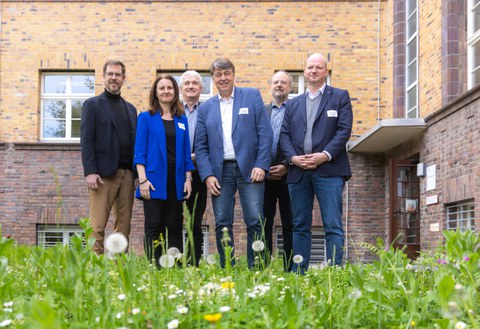24.04.2025
Künstliche Intelligenz in der Medizin: Neues sachsenweites Netzwerk KIMed soll Expertise und Ressourcen für eine starke Infrastruktur und Datensicherheit vereinen

Staatssekretärin Prof. Dr. Heike Graßmann und die Projektleiter KIMed zur Kickoff-Veranstaltung am 23. April (v.l.): Prof. Dr. Martin Sedlmayr (TU Dresden), Dr. Matthias Nüchter (Universität Leipzig), Prof. Dr. Christoph Meyer (Hochschule Mittweida), Prof. Dr. Toralf Kirsten und Prof. Dr. Thomas Neumuth (beide Uni Leipzig).
Ein neues Netzwerk und eine sichere Forschungsumgebung für künstliche Intelligenz in der Medizin: Dieses wichtige Ziel verfolgen Forschende aus Sachsen in den nächsten drei Jahren mit dem Projekt „KIMed – Netzwerk für Künstliche Intelligenz“. Zum offiziellen Projektstart am gestrigen Mittwoch, 23. April, kamen Teilnehmende sowie Projektpartner:innen in Leipzig zusammen. „KIMed“ wird von der Universität Leipzig, der Technischen Universität Dresden sowie der Hochschule Mittweida geleitet und durch den Freistaat Sachsen sowie den Europäischen Fonds für regionale Entwicklung mit 3,6 Millionen Euro gefördert.
Anwendungen der Künstlichen Intelligenz (KI) durchdringen die Medizin mit großer Geschwindigkeit. Sie eröffnen neue Möglichkeiten für Diagnostik, Therapie und Forschung. Mit leistungsfähigen Algorithmen zur Bildanalyse, Sprachverarbeitung und Biosignaldiagnostik können medizinische Daten effizient genutzt werden. Gleichzeitig erfordert der Einsatz von KI in der Medizin sichere und vertrauenswürdige Dateninfrastrukturen, um sensible Informationen datenschutzkonform zu verarbeiten.
Mit KIMed soll nun in Sachsen eine geschützte und sichere Forschungsumgebung für medizinische Daten etabliert werden. Diese Infrastruktur ermöglicht die Nutzung großer, vernetzter Datensätze unter strengen Datenschutzrichtlinien und unterstützt den Einsatz von KI-Methoden in der medizinischen Forschung.
„Mit starken Partnern und einem klaren Fokus auf Kompetenzaufbau, neue Projekte und sichere Datenräume wollen wir Expertise und Ressourcen der medizinischen KI-Community in Sachsen zusammenbringen, um gemeinsam Ideen und Lösungen für die Zukunft zu entwickeln“, sagt Prof. Martin Sedlmayr, Direktor des Zentrums für Medizinische Informatik (ZMI) und Dresdner PI des Projekts.
In den kommenden Jahren wird ein Verzeichnis mit relevanten Netzwerkpartnern, medizinischen Datenquellen, Algorithmen und KI-Tools aufgebaut, um den Zugang zu wichtigen Ressourcen zu erleichtern. Große Datensätze aus bestehenden Forschungsprojekten werden vernetzt und für das Training leistungsfähiger KI-Modelle aufbereitet. Neu konzeptionierte Anwendungsfälle zeigen Möglichkeiten, wie KI-Algorithmen in einer geschützten Umgebung genutzt werden können.
„KI-basierte Anwendungen revolutionieren bereits heute Diagnostik, personalisierte Therapie und Prävention“, sagt Wissenschaftsminister Sebastian Gemkow: „Wir erleben derzeit, wie Algorithmen Krankheiten in bildgebenden Verfahren früher erkennen oder individualisierte Behandlungsstrategien entwickeln. Aber jede KI ist nur so gut, wie der Datenschatz, auf den sie zugreift. Das KIMed-Netzwerk will hier zusammen, institutionenübergreifend mehr erreichen und eine einzigartige und sichere Forschungsdaten-Infrastruktur aufbauen, die für alle nur denkbaren medizinischen Anwendungsfälle in Zukunft zur Verfügung steht und mit Hilfe von KI noch bessere Behandlungsmöglichkeiten erschließt.“
Prof. Esther Troost, Dekanin der Medizinischen Fakultät der TU Dresden, unterstreicht: „Der Einsatz von Künstlicher Intelligenz ist mittlerweile ein wichtiger Teil der Forschung. Wir sehen es als eine große Chance und wichtige Aufgabe, die nächste Generation an Ärztinnen und Ärzten sowie Wissenschaftlerinnen und Wissenschaftler gezielt auf diese Herausforderungen vorzubereiten. Die enge Anbindung an das KIMed-Netzwerk wird Projekte von Promovierenden, Nachwuchsgruppen und erfahrenen Forschenden gleichermaßen stärken.“
„Als Universitätsklinikum wollen wir diesen Fortschritt aktiv mitgestalten – patientenzentriert und wissenschaftlich fundiert“, erklärt Prof. Uwe Platzbecker, Medizinischer Vorstand des Universitätsklinikums Dresden. „KIMed ermöglicht es uns, vorhandene Stärken am UKD in IT, Forschung und Versorgung noch besser zu vernetzen und so neue Impulse für Versorgungsansätze, innovative Studien und verbesserte Patientenpfade zu setzen.“
KIMed schließt neben den sächsischen Forschungseinrichtungen und den Universitätskliniken Dresden und Leipzig, auch regionale Gesundheitsversorger und Partner der IT-Branche ein. Es ist eins von sieben Projekten, das im Rahmen der EFRE/JTF-Förderung des SMWK in der Ausschreibung „Forschungsnetzwerke an öffentlichen Wissenschaftseinrichtungen“ ausgewählt worden ist.
Kontakt:
Prof. Dr. Martin Sedlmayr, Principal Investigator von KIMed in Dresden
Direktor des Zentrums für Medizinische Informatik (ZMI)
+49 351 458 2437
Dr. Matthias Nüchter, Principal Investigator KIMed
Universität Leipzig, Leiter LIFE Management Cluster
+49 341 97 16720
matthias.nü
